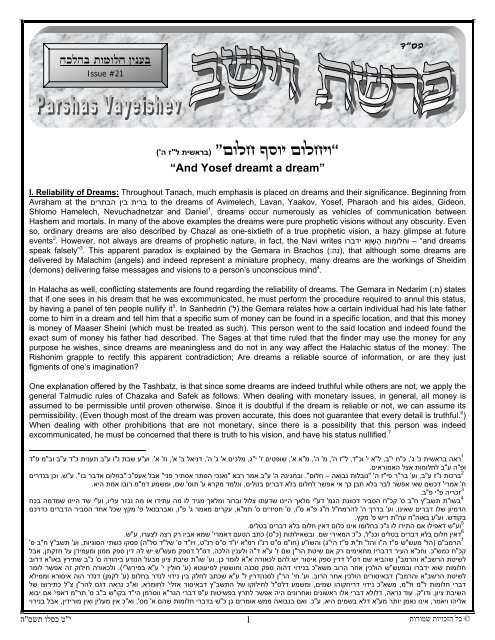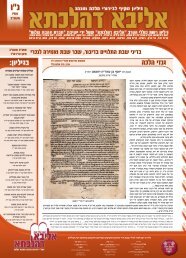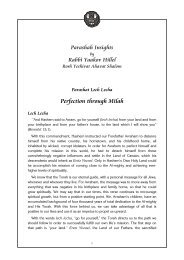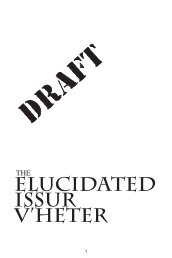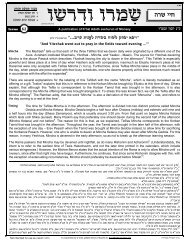Parshas Toldos - Ner Gavriel
Parshas Toldos - Ner Gavriel
Parshas Toldos - Ner Gavriel
- No tags were found...
Create successful ePaper yourself
Turn your PDF publications into a flip-book with our unique Google optimized e-Paper software.
ח(ל(II. Dreams in Halachic Rulings: Although the dependability of dreams is quite doubtful, surprisingly, dreams consistentlyare mentioned in the Poskim as the source for Halachic rulings. In fact, one of the Rishonim – R’ Yaakov of M’reish,authored an entire sefer ( ) of Halachic rulings that he received through dreams. Another Rishon – the S’mag( , writes that he originally did not wish to include the Mitzva of ' השמר לך פן תשכח (which forbids us frombecoming haughty) as one of the 613 Mitzvos listed in his work. That very night he was informed in a dream that he hadomitted this commandment. Another ruling based on a dream that is mentioned in the Poskim, is that on Succos whenholding the Arbah Minim, one must hold the Esrog next to the Lulav and not separately 8 .את השו"ת מן השמים"ת ס"דAs we have seen, dreams are occasionally used as a determining factor in Halachic decisions. At other times, Halachicrulings are dismissed precisely because they originate from nocturnal reveries. The Rama states that a worker who hasalready received advance payment for a day’s work, and then falls ill, does not need to return the payment he hasreceived. To this ruling the Shach counters, that it originates from a dream that came to the Maharam and is thereforemeaningless 9 .Another interesting place where dreams played a prominent role is in the naming of the Sefer Or Zaruah. This Sefer isauthored by one of the Rishonim by the name of R’ Yitzchok of Vienna. Prior to writing his sefer, he had been pondering aquestion regarding the spelling of the name עקיבה when written in a Get (divorce). His uncertainty was whether it shouldאור זרוע לצדיק – Passuk be spelled with the letter “Hay” or “Alef” at the end of the name. In his dream he was shown the– with a “Hay”. He was so impressed with this vision עקיבה , in which the final letter of each word spells ולישרי לב שמח הthat he named his renowned Halachic treatise “Or Zarua”. Of note is that in the Sefer Or Zaruah itself, he also makesother references to Halachic rulings based on dreams 10 .III. Vows in Dreams: We have already discussed above, how one who was excommunicated in a dream must obtainnullification of this status. The Poskim discuss the eventuality of someone making a vow in his dream. The Ran states thatalthough “excommunication” is considered valid when seen in a dream, this is only since we assume that this individualwas shown that he has been shunned by the Heavenly Tribunal. Since a vow can only be valid if one annunciates his oathin a clear mental state, a vow made in a dream is meaningless. The Rashba argues that even a vow made in a dreamneeds to be nullified. In addition, although normally nullification of a vow only requires three people to jointly nullify it,since this sort of vow is Heavenly initiated, a panel of ten should preferably be present 11 .One who undertakes in a dream to perform a specific Mitzva, must do so and may not have his pledge nullified. Thereason for this is that we assume that his dream was an encouragement from Heaven for this Mitzva to be done 12 . Onewho swears falsely in a dream need not be concerned with this and does not need to do Teshuva 13 .IV. Nullifying Dreams – חלום :הטבת Someone who sees a disturbing dream that seemingly is foretelling tragic futureevents, is supposed to fast on that day. The Gemara states that this is an extremely effective way of neutralizing anyominous tidings, as it is likened to incinerating the entire decree. So important is this fast as Chazal allowed one to fasteven on Shabbos (when it is prohibited to fast) to nullify his dream 14 . Nowadays, although we no longer fast on Shabbosדריחקוהו שמים שפיר יש לחוש לדברי נביאות, ודו"ק ואכמ"ל. וע' שיבת ציון שם שמסיק לבסוף דיש חילוק בין איסורים מכאן ולהבא לאלו שכבר חלו כמו מעש"ש,ע"ש. וע"ע בשד"ח ח"ב מער' ד' מ"ה שהעיר על הנו"ב ביו"ד מהדו"ת ס"ל שכתב דד"ח לא מעלין ולא מורידין לאסור דג שקורין ברבוטא מכאן ולהבא, דסותרדבריו בשיבת ציון, ע"ש.ב"י או"ח ס' תרנ"א אות י"א בשם רבינו מנחם מרקנ"ט (הריקאנטי) פ' אמור, ע"ש.רמ"א ס' של"ג וש"ך שם ס"ק כ"ה, דד"ח ל"מ ול"מ כ"ש הכא דלא מסתבר כלל, וע' שד"ח הנ"ל שתירץ דלפי דברי התשב"ץ הנ"ל בממון הולכין אחר המוחזק,וכיון שכבר נתן לו המעות הו"ל מוחזק ואין להוציאן, ויל"ע בזה ואכמ"ל.כ"כ בסדר הדורות בערך המחבר, וע' בהקדמה לאור זרוע שרמז לזה. וע"ש בדף צ"ג ע"ג שהביא פסק מחלום והובא בט"ז אה"ע ס' קכ"ט סקל"ה. וע' ברדב"ז"ו ס' אלפים רפ"ו) שבתחילה התיר לא' לשנות התפילין שלו מרש"י לר"ת, ואח"כ חזר בו כי הראו לו בחלום שלא יפה הורה. וע"ע בספרו מגדל דוד על שה"שפ"ז פ"י. ובשו"ת מן השמים (ס"ג) כתוב שהקב"ה ס"ל דהויות באמצע כשיטת ר"ת וכל פמליא של מעלה ס"ל דהויות כסדרן כרש"י.ר"ן נדרים ח' ע"ב ד"ה כשם, והביא שם דברי הרשב"א בתשובה (ח"א ס' תרס"ח וכן בח"ג ס' של"א ובמיוחסות ס' רס"ה) בשם הגאונים שהצריכו היתרבעשרה, וכתב דיש לחוש לדבריהם. וע' בטור ס' ר"י בשם הרא"ש בתשובה כלל ח' ס' י"א דנדר בחלום אינו כלום דצריך פיו ולבו שוין וכאן אין פה ואין לב. ובאמתגם הגאונים לא הצריכו היתר אלא לעשות מדה יתירה, ע' אוצר הגאונים נדרים שם. אמנם הב"ח וכן הש"ך סק"ה כתבו דנהגינן כהרשב"א בשם הגאוניםולחומרא. וכתב הרמ"א דמ"מ אם אין עשרה סגי להתירו בג'. וע"ש בהב"ח דאשה שנדרה בחלום צריך התרה לשיטה זו ולא מהני הפרת הבעל ביום שמעו דדינוכמו נידוי שהצריכו י'. ויל"ע להרמ"א דסגי בג' עכ"פ בשעת הדחק אם גם הפרה מהני. וע' בש"ך שם סק"ד דאפילו התירו לו בחלומו אינו כלום כמו גבי נידוי דאמרי'אין חלום בלא דברים בטלים. ובפתת"ת הביא משו"ת פרח שושן שחולק עליו דשאני נידוי דריחקוהו שמים, ע"ש.שו"ת הרדב"ז ח"א ס' צ"ט. וע' שו"ת חת"ס ח"ב יו"ד ס' רכ"ב בענין מי שקיבל בחלום שלא לאכול מצה שרוי' (גברוקס) דאינו מצוה ממש רק מדת חסידות, וישלה התרה.13שד"ח שם בשם ס' ברך משה שנסתפק בזה ומסיק דאין צריך. ונראה פשוט כדבריו דמ"ש משאר עבירה שעשה בחלום דאין צריך כפרה, וגדולה מזו אמרובברכות נ"ז "הבא על אשת איש בחלום – מובטח לו שהוא בן עוה"ב"."יפה תענית לחלום כאש לנעורת וכו' ואפילו בשבת" – שבת י"א ע"א ותענית י"ב ע"ב. וע' ברמ"א (ר"כ) דהיינו דוקא באותו יום, ובמ"ב (רפ"ח סקט"ו) כתבדדוקא אם נפשו עגומה עליו ויותר עונג לו להתענות כדי לרגוע דעתו. וכן דוקא לחלומות שמתענין עליהן כמבואר בשו"ע שם, ובשם השל"ה כתב דאפילו באלו איןלהתענות בשבת רק יתענה שתים בחול, ע"ש.8910111214© כל הזכויות שמורותי"ט כסלו תשס "ה2
since we are not proficient in interpreting dreams ( ), Chazal describe two alternative remedies to annul the effectsof dreams. The first is called חלום ,הטבת a procedure where the dreamer stands before three of his friends and states “Ihave dreamt a favorable dream”. They in turn concur and answer together, that the dream he has seen is really foretellinggood events and he does not need to be concerned. The efficaciousness of this procedure is due to the rule of Chazalthat all dreams follow the manner in which they are interpreted. In other words, dreams only have an effect for good or forbad based on how they were interpreted. The Gemara in Berachos ( נ( gives numerous examples of this, where theeffect of the dream was determined by its interpretation. One may do הטבת חלום on Shabbos 15 ."ה ונ"ושו"ע שםAnother suggestion offered by the Gemara ( ) is to say a certain prayer (printed in all Siddurim), while the Kohanim arereciting Birchas Kohanim (“Duchaning”). This is a very favorable time for prayer in general and especially for dreams.Some Acharonim mention that one can also accept on himself a Taanis Dibbur – to abstain from any idle chatter for anentire day, as this can be effective for countering dreams as well 16 .שםNot only are one’s own dreams an object of concern, but even if someone dreams about a tragedy occurring to anotherperson it is problematic. In fact, even if a child or a slave dreams about someone else, the above remedies should beapplied. A non-Jews dream’s are not of concern 17 . One who dreams about someone else should perform the aboveprocedures, specifying that he is doing so for a dream he dreamt on someone else 18 . He does not need to relate thedream to the subject. If the dreamer is unable to do these things, he should then tell the subject so that he can do so forhimself. In either case, both parties should do Teshuva 19 .One who dreams of favorable tidings should be sure to remember the details of his dream, or even record it. The Zohar 20ויזכור יוסף says, learns this concept from the dreams of Yosef, since when his dreams finally came to fruition the Passukrealization. “and Yosef remembered the dreams”, indicating that this was a crucial factor in the dream’s – את החלומותFurthermore, one should not relate the dream to anyone else, even one’s spouse, since blessings are only effective onthings that are hidden 21 .Nowadays: In recent times, many Gedolim often have advised people who dreamt disturbing dreams not to attributemuch significance to them. The Chazon Ish would advise people to say the prayer during Birchas Kohanim, without any,הטבת חלום further action, whereas for himself he would not do so at all 22 . The Steipler would on occasion suggest doingas did the Brisker Rov. Some explain the reason for this as follows: Nowadays, with the easily accessible proliferation ofworld events, a day does not go by without one hearing of some tragedy or another from the remotest places on theglobe. While generally these events do not affect a person on a personal level, they can certainly cause him to imaginethem happening to him "ע . Since most dreams are based on thoughts from the previous day, it is not surprising at all thatthese thoughts germinate during the night. For this reason much less significance is attributed to dreams than in earliertimes 23 .לThe Gemara in Brachos ( י( states that someone who involves himself in learning Torah prior to going to sleep, isguaranteed not to receive bad tidings in his dreams. Similarly, one who recites Krias Shema Al Hamitah is offered similarprotection 24 . While a person sleeps, his soul returns to Heaven to relate the events of the day. One whose soul departsfollowing the learning of Torah has insured himself that no evil decrees will be pronounced on him. By doing so, he haseffectively circumvented such decrees, rather than trying to have them repealed after the fact - a far more difficult feat..ואל יבהלנו חלומות רעים והרהורים רעים tidings, May we in the future only hear goodGood Shabbos."ד ע"אמאיר הלוי הלמןפעיה"ק תובב "אבפמ"ג ס' רפ"ח בא"א אות ט' וכן במ"ב ר"כ סק"ג כתבו דעושין הט"ח בשבת, אמנם בפתח הדביר ס' ר"כ כתב דאין עושין וכעין מש"כ הב"י באבקת רוכל ס' י"אלענין מי שברך לחולה בשבת כיון דמצער לציבור. וע' ערוה"ש ר"כ ס"ד, דגם אפשר לעשות הט"ח ע"י חכם בלא ב"ד.ר"ח פלאגי בספרו רוח חיים בס' רפ"ח וכן בספרו כף החיים ס' ל"ו אות נ"ח בשם בעל המדרש תלפיות והובא בפסקי תשובות.שאילתות (כ"ט) והעמק שאלה שם דקים להו לחז"ל דאין חלומות של גוים כלום ע"ש, וכעת איני יודע לאיזה חז"ל נתכוון. אולם ע' בשד"ח שם בשם המדרשיםדיש לחשוש, ע"ש וצ"ע. וע' שו"ת רדב"ז אלף קע"א, ואנצ"ת ח"ז עמ' פ"ח הערה ואין אדם צריך לחשוש לחלום חבירו רק אם נאמן עליו כבי תרי, ע' העמקשאלה שם, מ"א ס' רפ"ח סק"ב ובפמ"ג.כ"פ המ"ב ר"כ סק"ו.19ס' חסידים ס' תמ"ד.20פ' מקץ הובא בפסקי תשובות.ס' חסידים ס' תמ"ז, "דאין נס בגלוי”. ואע"פ שאין ראי' לדבר זכר לדבר, ע' ב"מ מ"ב ע"א "שאין הברכה מצוי אלא בדבר הסמוי מן העין". אמנם העירוני דגבייוסף סיפר חלומו לאחיו, ואולי כוונתו דוקא בזמה"ז, וצ"ע.ע' אגרות חזו"א ח"ב ס' קמ"ט ארחות רבינו ח"ג עמ' רי"ג וח"א עמ' צ"ב, ומשמע שפעמים אמר לחשוש ופעמים לא, וסוד ה' ליראיו.דאין מראין לו לאדם אלא מהרהורי לבו, ע' ברכות נ"ה. כך הסביר בפסקי תשובות ס' רפ"ח, וכעי"ז כתב הערוה"ש בס' ר"כ, ובארחות רבינו ח"א שם.שאילתות שם ע"פ דברי ההעמק שאלה..64-661516171821222324© כל הזכויות שמורותי"ט כסלו תשס "ה3
השמטות:(1(2ע' זכר דוד מאמר ראשון כרך ב' פ' פ"ט באריכות בכל הענין.ע' מהרש"א ברכות ג' ע"א ד"ה ואשה, בענין חלום ע"י מלאך ושד© כל הזכויות שמורותי"ט כסלו תשס "ה4


